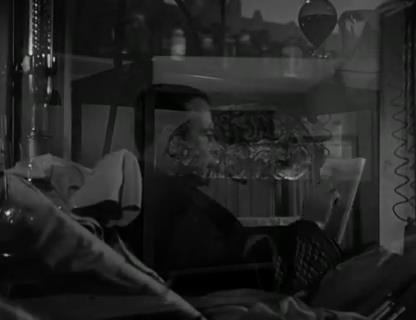Deluge
La Distruzione del Mondo in the
Italian dub that presently remains, only the Statue of Liberty stands against
the flood.
A horrifying
spectacle advanced and intensified in some respects by The War of the Worlds (dir. Byron Haskin), another memory is Things to Come (dir. William Cameron
Menzies). The devastation is such that Rod Serling evokes it in “Time
Enough at Last” (The Twilight Zone,
dir. John Brahm) and mimics it in “One More
Pallbearer” (dir. Lamont Johnson), there is also Richard Brooks’ Wrong Is Right on a similar basis.
Franklin J. Schaffner’s Planet of
the Apes goes still further.
One is in the
middle of nowhere, not forty-five minutes from Broadway but “about forty
miles from where New York was,” leading a primitive existence, cf. Corman’s Day the World Ended, Oboler’s Five.
A vacation resort
in the mountains is wrecked but has a sizeable population (cf. Clair’s Paris qui dort). Laws take hold
enjoining marriage, a husband and wife live separated by the catastrophe.
A gang of thieves
and rapists and murderers roam free, leaving corpses in plain sight.
Stroheim’s Greed is a visible inspiration,
cf. Wellman’s Beggars of Life. The profusion of films
that follow this one includes Siegel’s Invasion of the Body Snatchers, Romero’s Night of the Living Dead, Salkow’s The Last Man on Earth or Sagal’s The
Omega Man and so forth in various ways.
Feist is a rare
master of surprise, among other
things.
Mordaunt Hall of the New
York Times was not impressed, “rumbling and gurgling thriller”.
Leonard Maltin, “second-rate melodrama.”
Hal Erickson (Rovi), “remarkable”.
The finest understanding
obtains in Mervyn LeRoy’s Homecoming.
Guilty of Treason
The trial of
Cardinal Mindszenty.
“If a few
people could just stick together.”
“They’d
probably disappear separately.”
A joke from
Curtiz’ Casablanca sets the tone very accurately, with Dmytryk in Soldier
of Fortune Feist understands the Second Thirty Years War (1914-1945) as the
Second Hundred Years War, or worse.
Hathaway’s 13
Rue Madeleine is very strongly indicated, Furie’s The Ipcress File
and Roeg’s the Man who fell to Earth are foreseen.
Halliwell’s
Film Guide sees a “gutter
press version of real events” in this witty masterpiece.
Shaving points
off college games, it’s big business on the gambling side, “the fix
was in.”
A clean sharp
film on the dilemma. “Can you put glory in the bank?”
The
cinematography by Stanley Cortez has been noted, but the very keen script and
other notable contributions have not.
Michael
Ritchie’s Diggstown is the
latter end of it.
The Big Trees
Bad law makes
hard cases. Termite Terrace had a field day with this title, the mention of
which sent dogs yelping in anticipation.
The screenplay is
honed to a razor’s edge, and it sings. It would seem that all Feist has
to do is photograph the scenery, but he gives you walloping great shots like a
360░ track on Douglas and Buchanan taking a redwood’s measure.
Two
of Warner Brothers’ finest hours, with a good score, fine Technicolor,
and superlative performances, notably from Edgar Buchanan, who shows himself
the Rip Torn of his day.
Battles of Chief Pontiac
“These
Indians are fools,” says Colonel Von Weber, “and stupid!”
This is midway between Griffith’s America
and Penn’s Little Big Man, and
shows the construction of a thesis round the “teeming industrial
metropolis” of Detroit. The marriage forced by political circumstances is
a feature of Pollack’s Jeremiah
Johnson, for example. “Sooner or later I’ll have you
court-martialed and shot,” says the white man’s white squaw. The
compulsory spanking is midway between Capra’s Meet John Doe and McLaglen’s McLintock!,
from the Swan of Avon.
Fort Detroit it
was, to begin with.
TV Guide,
“a real hatchet job”.
Mighty pretty
landscapes (cinematography Charles Van Enger, score
Elmer Bernstein, screenplay Jack DeWitt).
“Do you
have a mirror?”
“Mirror?”
“Mirror! Look...”
“See self
in water.”
Berry Kroeger as
Von Weber, Roy Roberts holding the fort, Helen Westcott, Lex Barker, the chief
of the Ottawas is played by Lon Chaney, Jr. A useful comparison can be made to
Boetticher’s Seminole, for
another example.
The smallpox
gifts have been reported down the ages.
“In
all humanity, Sir!”
“By
humanity you refer of course to my soldiers.”
The Herzogian last of Von Weber solus at length establishes the
basis as Fort Apache (dir. John
Ford).
Halliwell’s Film Guide, “undistinguished” by even the final
gag.
Donovan’s Brain

Feist’s
brilliant exercise of cinematic resources has primarily Stanley Cortez as cinematographer
to govern the image.
Dr. Mabuse is the
invisible presence behind this fašade, he is suitably
winnowed down to the title character, the mind of a certain millionaire, a
worshipper at the altar of Mammon.
Dmytryk’s The Devil Commands is much in evidence
as the proximal basis. Charles Beaumont’s “Dead Man’s
Shoes” for The Twilight Zone
(dir. Montgomery Pittman) is a similar case of possession, aspects of which
also occur in Rilla’s Village of the Damned and Leader’s Children of the Damned, notably. The monkeys at the end of
Herzog’s Aguirre, der Zorn Gottes are placed
here at the beginning, LeRoy’s The
Bad Seed draws the same conclusion.
Dead in a crash,
kept alive by a fool, “Mr. Donovan’s—remains,” scheming
on even to the point of murder, finally ended by reason and the forces of
nature.
“The truth
is always dangerous, Mr. Fuller, in the Donovan situation it entails great
misfortune to all who know. Believe
me, your ignorance is insurance for personal safety. Mr. Donovan intends to
dominate the international financial scene, and a fatal accident will occur to
all who happen to stand in his way.”
Bosley
Crowther of the New
York Times, “utterly silly.” Leonard Maltin,
“intriguing... modest, capable”. Time Out, “neat... modest but
effective.” TV Guide,
“adheres most closely to the original”. Cavett Binion (Rovi),
“effective and intelligent”. Halliwell’s
Film Guide, “modest competence marks this”.
Pirates of
Tripoli
Casablanca (dir. Michael Curtiz) is the obvious key, with Paul
Henreid to set the seal on a certain wartime bit of repartee about Nazis in New
York.